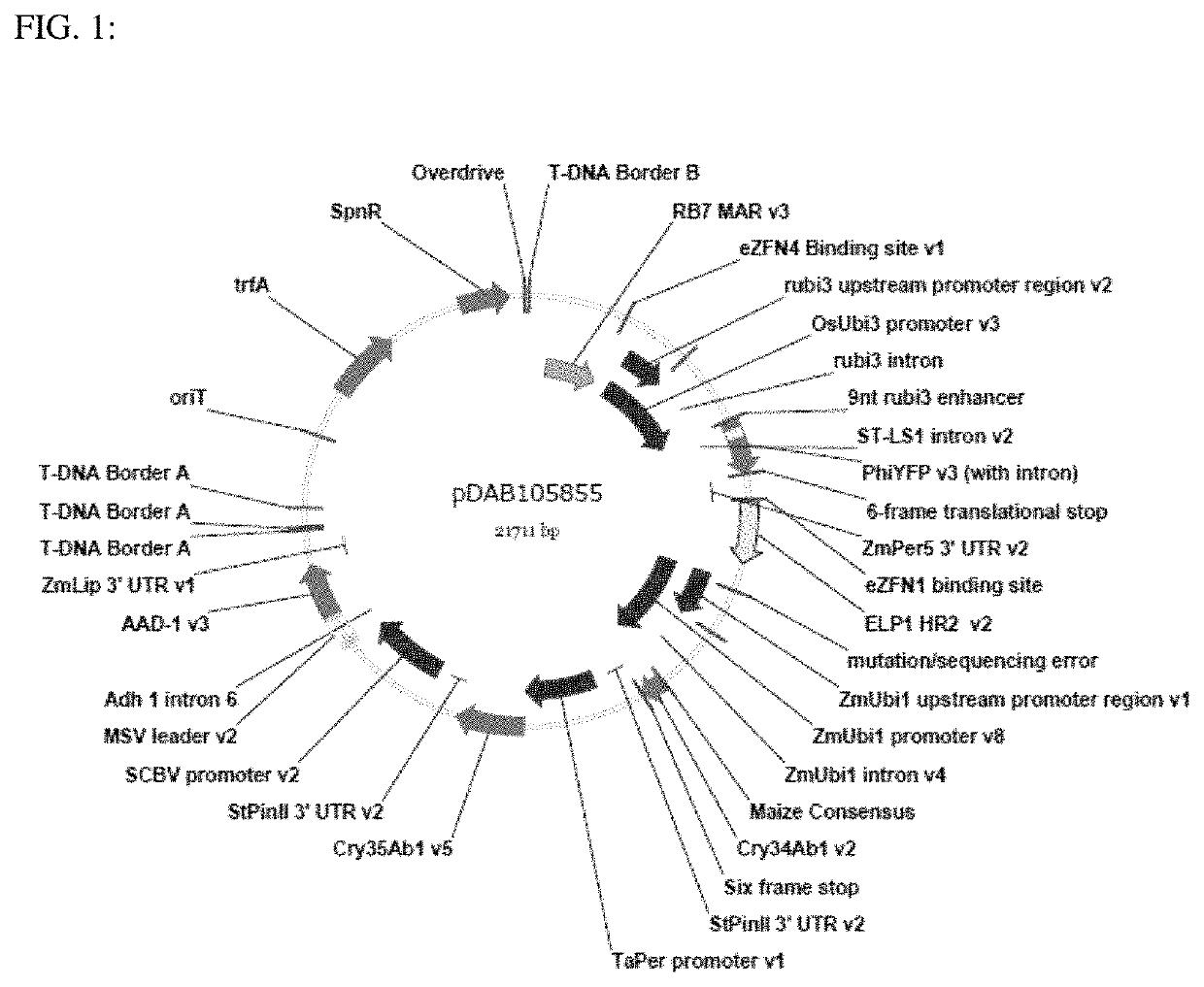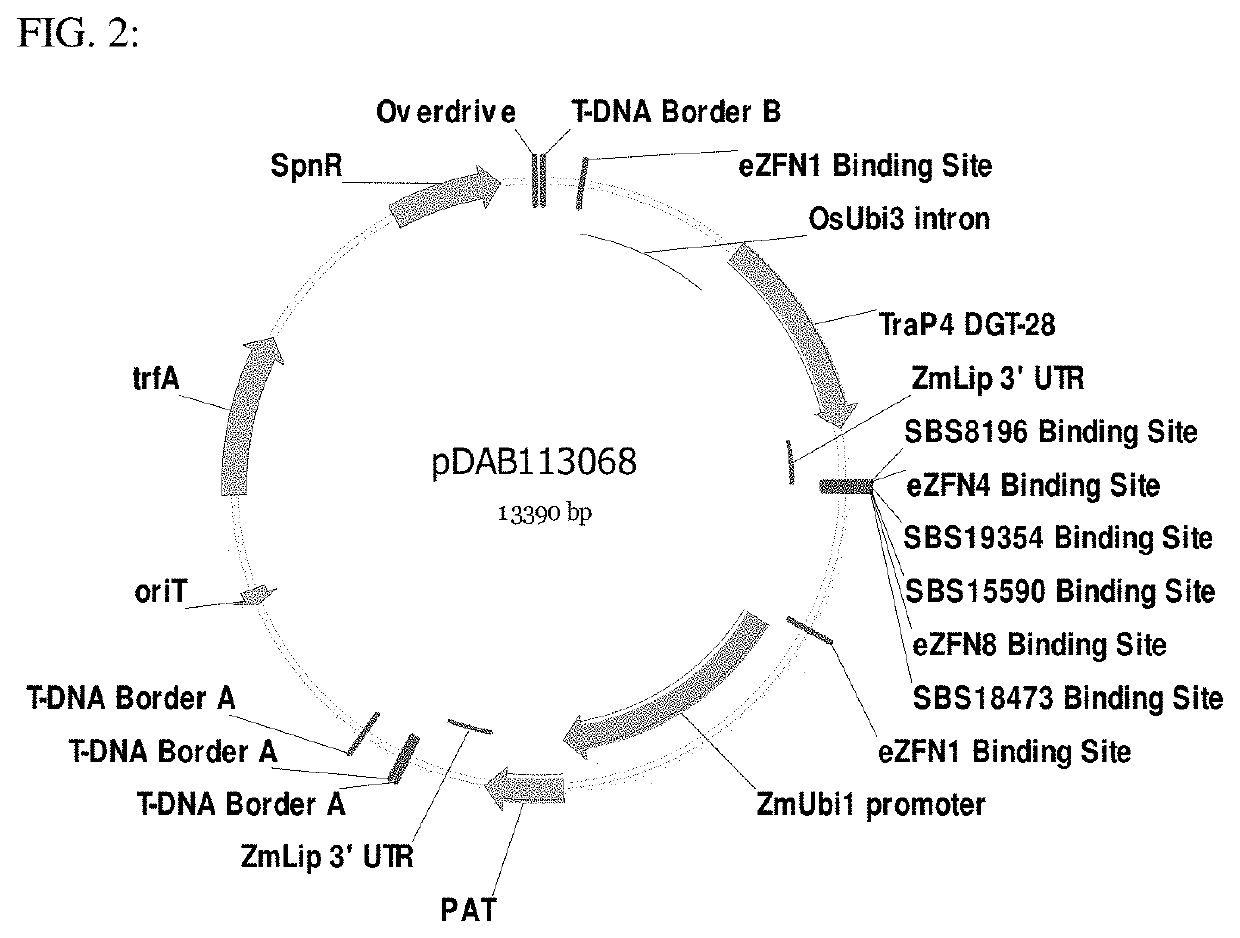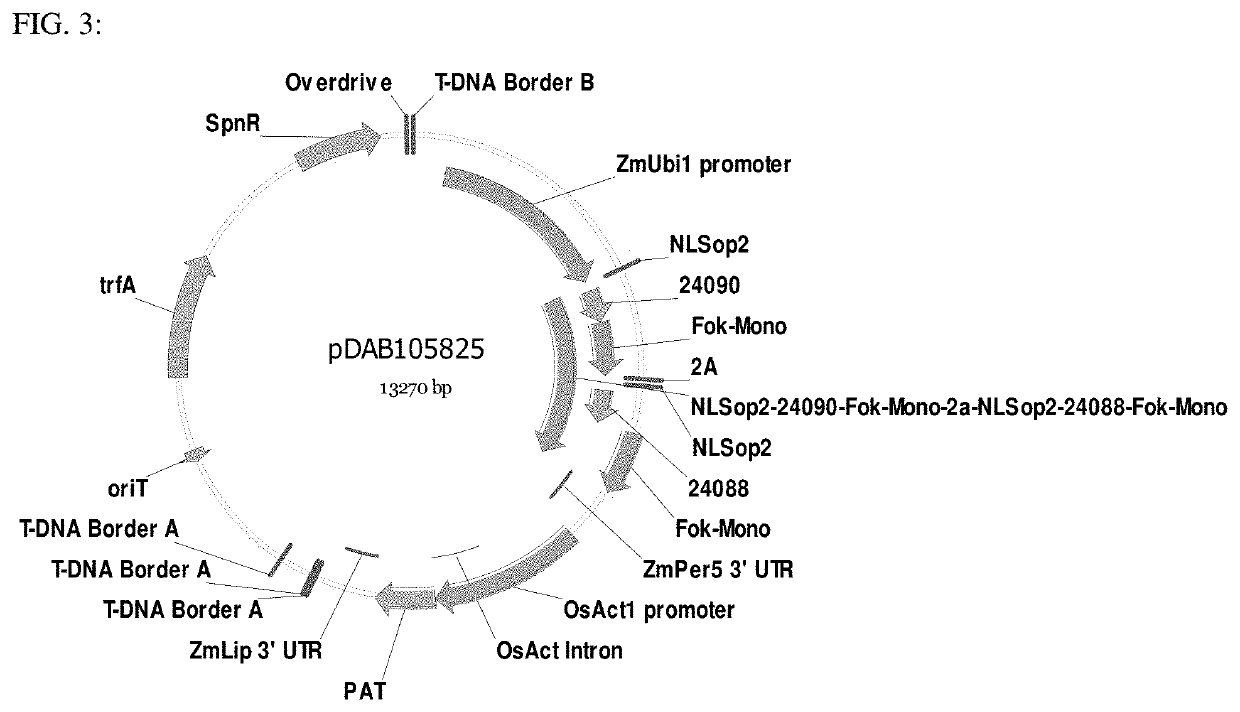Methodologies and compositions for creating targeted recombination and breaking linkage between traits
a technology of recombination and composition, applied in the direction of hydrolases, plant genotype modification, biochemistry apparatus and processes, etc., can solve the problems of reducing yield, reducing resistance to disease, and reducing resistance to pests, so as to increase the frequency of genetic recombination
- Summary
- Abstract
- Description
- Claims
- Application Information
AI Technical Summary
Benefits of technology
Problems solved by technology
Method used
Image
Examples
example 1
Gene Expression Construct
[0161]The Engineered Transgene Integration Platform (ETIP) was previously described in U.S. Patent Application No. 20140090113A1, herein incorporated by reference in its entirety. The ETIP contains an engineered landing pad sequence, several engineered zinc finger binding sites (eZFN), and gene expression cassettes as shown in the binary plasmid vector pDAB105855 (FIG. 1; SEQ ID NO:1). As described in U.S. Patent Application No. 20140090113A1, the binary plasmid, pDAB105855, was transformed and integrated into the genome of Zea mays c.v. B104 (see, Example 8 of U.S. Patent Application No. 20140090113A1). Positive transgenic plants containing full-length, simple insertion events of the pDAB105855 T-strand insert were confirmed via molecular analysis (see, Example 6 of U.S. Patent Application No. 20140090113A1). The transgene expression cassettes within the Agrobacterium border regions of pDAB105855 were located within the chromosome of the Zea mays c.v. B104 ...
example 2
Gene Expression Construct
[0162]A second gene expression construct containing the dgt-28 transgene and several eZFN binding sites was designed and built. This gene expression construct was labeled as pDAB113068 (FIG. 2; SEQ ID NO:2) and contained the following gene elements: the eZFN1 Binding Site; the Oryza sativa Ubiquitin 3 intron (OsUbi3 intron; Sivamani, E., Qu, R., (2006) Plant Molecular Biology 60; 225-239) driving the expression of the dgt-28 transgene (DGT-28; International Patent Application No. 2013116700) fused with the TraP4 chloroplast transit peptide (International Patent Application No. 2013158766) and terminated by the Zea mays lipase 3′UTR (ZmLip 3′UTR; U.S. Pat. No. 7,179,902); a linker region containing multiple site specific nuclease binding sites (SBS8196 Binding Site::eZFN4 Binding Site::SBS19354 Binding Site::SBS15590 Binding Site::eZFN8 Binding Site::SBS18473 Binding Site::eZFN1 Binding Site); and, the Zea mays Ubiquitin1 promoter (ZmUbi1 promoter; Christense...
example 4
Confirmation of Copy Number at T0
[0167]Putative transgenic Zea mays plants were sampled at the V2-3 leaf development stage for transgene presence using a pat transgene quantitative PCR assay. Total DNA was extracted from leaf punches using MagAttract® DNA extraction kit (Qiagen) as per the manufacturer's instruction.
[0168]To detect the genes of interest, gene-specific DNA fragments were amplified with TaqMan® primer / probe sets containing a FAM-labeled fluorescent probe for the pat transgene and a HEX-labeled fluorescent probe for an endogenous reference gene control. Next, the PCR reactions were carried out in a final volume of 10 μl reaction containing 5 μl of Roche LightCycler® 480 Probes Master Mix (Roche Applied Sciences, Indianapolis, Ind.); 0.4 μl each of the primers from 10 μM stocks to a final concentration of 400 nM; 0.4 μl each of the probes from 5 μM stocks to a final concentration of 200 nM, 0.1 μl of 10% polyvinylpyrrolidone (PVP) to final concentration of 0.1%; 2 μl of...
PUM
| Property | Measurement | Unit |
|---|---|---|
| volume | aaaaa | aaaaa |
| volume | aaaaa | aaaaa |
| frequency | aaaaa | aaaaa |
Abstract
Description
Claims
Application Information
 Login to View More
Login to View More - R&D
- Intellectual Property
- Life Sciences
- Materials
- Tech Scout
- Unparalleled Data Quality
- Higher Quality Content
- 60% Fewer Hallucinations
Browse by: Latest US Patents, China's latest patents, Technical Efficacy Thesaurus, Application Domain, Technology Topic, Popular Technical Reports.
© 2025 PatSnap. All rights reserved.Legal|Privacy policy|Modern Slavery Act Transparency Statement|Sitemap|About US| Contact US: help@patsnap.com



